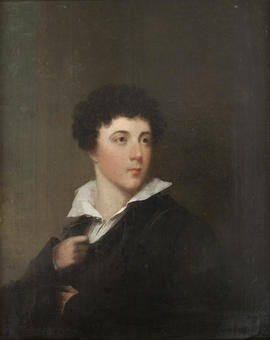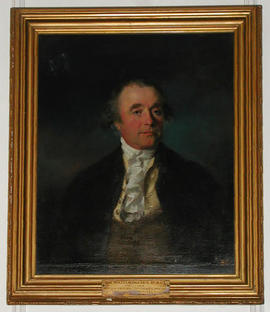MURRAY, WILLIAM, 1ST EARL OF MANSFIELD, fourth son of David Murray, 5th Viscount Stormont (S), and Margery, only child of David Scott, Scotstarvet, Fifeshire; b. 2 Mar 1704/5; adm. May 1718; for his journey from Scotland to Westminster on back of his pony, and for some curious items in the account of monies disbursed on his behalf before and after admission, see Lord Campbell, Lives of the Chief Justices, ii, 313-6; KS (Capt. ) 1719; elected head to Christ Church, Oxford 1723, matr. 18 Jun 1723, Westminster Student 24 Dec 1723 – void 29 Jun 1737; BA 1727; MA 1730; defeated William Pitt (Earl of Chatham) in competition for prize offered by University for a Latin poem on the death of George I; Grand Tour; adm. Lincoln’s Inn 23 Apr 1724, called to bar 23 Nov 1730, Bencher 15 Dec 1742, Treasurer 1744; practised in Court of Chancery, and within two years of call had appeared in three appeal cases before House of Lords; KC 1742; Solicitor-Gen., 27 Nov 1742 – Apr 1754; MP Boroughbridge 29 Nov 1742 – 8 Nov 1756; his success in the House of Commons was as brilliant as his success at the bar, and he came to be regarded as the ablest government spokesman in the House; to discredit him, an old story was raked up about his toasting the Pretender in the company of James Johnson (adm. 1717/8, qv) and Andrew Stone (qv), but the Privy Council reported that there was no foundation for the charge; it was subsequently the subject of a debate in the House of Lords on 22 Mar 1753, but the Duke of Bedford’s motion for the production of the proceedings before the Privy Council was rejected by 122 votes to 5, and no further enquiry was made (Campbell, ii, 370-6; Walpole, Letters, ed. Toynbee, iii, 148; the papers relating to the charge of toasting are in the British Library, Newcastle MSS 33050, ff. 200-368); Attorney-Gen., 9 Apr 1754 – Nov 1756; defended the Duke of Newcastle’s administration against attacks by Pitt in the House of Commons; on the death in 1756 of Sir Dudley Ryder, Lord Chief Justice, Murray claimed the vacant post and a peerage; Lord Chief Justice of England 8 Nov 1756 – 4 Jun 1788; created Baron Mansfield 8 Nov 1756; Privy Councillor 19 Nov 1756; held seals of Chancellor of the Exchequer Apr – Jun 1757, Sep – Dec 1767; accepted cabinet seat in Duke of Newcastle’s second administration, without office but with disposal of the Scottish patronage, Jul 1757; created Earl of Mansfield 31 Oct 1776, with special remainder to Louisa, wife of his nephew David Murray, 7th Viscount Stormont (S) (qv); owing to his approval of the Roman Catholic Relief Bill of 1778, his house in Bloomsbury Square was sacked and burned by the Gordon Rioters 7 Jun 1780; the loss of his library and MSS was lamented by William Cowper (qv) in some charming verses (Works, ed. Southey, viii, 322-3); spoke for last time in House of Lords 23 Mar 1784; after 1788 lived in retirement at Caen Wood, Highgate; received a new creation as Earl of Mansfield 1 Aug 1792, with special remainder to his nephew David Murray, 7th Viscount Stormont (S) (qv); the position which he held for many years as a Cabinet minister was anomalous; in Feb 1775 he stated in the House of Lords that “he had been a Cabinet Minister part of the late reign, and the whole of the present”, but that he had ceased “to act as an efficient Cabinet minister” shortly before the formation of the Rockingham ministry (Parliamentary History, xviii, 274-5); twice refused post of Lord Chancellor, but acted as Speaker of House of Lords Jan 1770 – Jan 1771 and Feb – Dec 1783; as a parliamentary speaker Pitt was his only rival; by birth a Jacobite and by association a Tory, his politics were more or less dominated by his legal interests; his reputation as a statesman is somewhat blurred by his support of the coercing of the American colonies; as an advocate known as “the silver-tongued Murray”; his ascendancy as Lord Chief Justice is indicated by the claim that during the thirty-two years that he held office there were only two cases in which his opinion was not unanimously adopted by his colleagues, and that only two of his judgments were reversed on appeal (Campbell, ii, 395-6); Mansfield’s charges to juries on the law of libel made him unpopular with contemporary public opinion, and he was violently attacked by Junius; the founder of modern commercial law and one of the greatest of common law judges; as a young man a friend of Pope, who dedicated to him his Sixth Epistle of the First Book of Horace, and cdelebrated his charms in Book IV, Ode I; Busby Trustee 25 Feb 1741/2; m. 20 Sep 1738 Lady Elizabeth Finch, seventh dau. of Daniel Finch, 6th Earl of Winchilsea and 2nd Earl of Nottingham (qv); d. 20 Mar 1793. Buried North Transept, Westminster Abbey (monument), having expressed a desire in his will to be buried there on account of “the love I bear to the place of my early education”. DNB.


